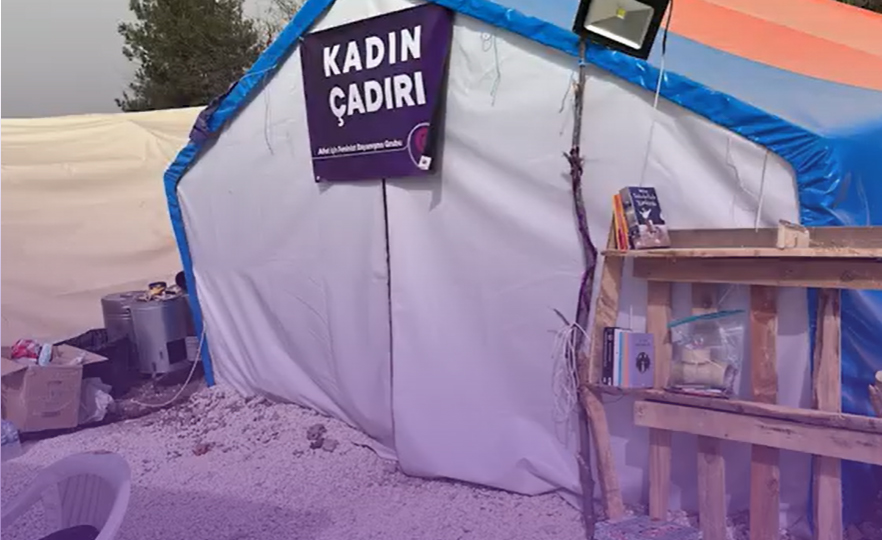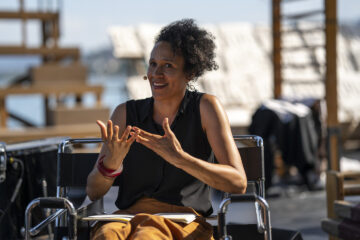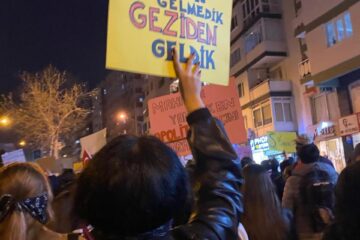In February, we witnessed two major earthquakes in the southeast of Turkey and northwest of Syria, with their epicenters located in Kahramanmaraş, impacting 11 large cities. According to official announcements, approximately 50 thousand people lost their lives, and millions were injured in these earthquakes, along with millions who lost their homes. More than 100.000 buildings were demolished as a consequence to the earthquakes, and some cities were completely destroyed together with all our cultural wealth and historical heritage. An earthquake is supposed to be a natural disaster. Still, the extent of the destruction and the resulting uncoordinated relief efforts have turned the earthquake in Turkey into a catastrophe. Although two months have passed since the earthquake, the Justice and Development Party (AKP) government, has once again shown how it has collapsed with all its organizations. They still couldn’t supply tents and shelter to its citizens whose houses have been demolished or have become uninhabitable during the cold winter days.
The AKP government, which has ruled Turkey for twenty years, has abandoned all its citizens’ basic rights and needs. From housing to health, they have left them to the mercy of the markets and the greed for profit with neoliberal policies it has implemented since the day it took control of State. Today, the government and its policies have turned a natural disaster into a catastrophe. For this exact same reason, the importance of prioritizing life over capital has once again been demonstrated, though very tragic events.
The main reason for the current disaster is that the policies implemented by the AKP government are directed against public interest. This is a government that dismisses reason, and all forms of sciences and knowledge, and only works to create profit for individuals through exploiting the public good and riches. The case of the February earthquakes is an exemplary illustration for this government’s conception of state institutions and responsibilities.
In Turkey, the Disaster and Emergency Management Presidency (AFAD) is a government institution under the Ministry of Interior, and it is in charge of providing this coordination. After AFAD was founded, other autonomous institutions in the country became affiliated with AFAD and were not allowed to act independently from it.
Despite declaring itself to be autonomous, AFAD was connected to the Ministry of Interior (based on the updated ministry’s bylaws) and became completely dysfunctional over the years. People with no experience and knowledge in disaster management were put in positions of power in the organization (due to their proximity to the government). It was turned into an organization that lacked infrastructure and did not follow technological developments in the field.
The hours following an earthquake are very critical: the only way to save the lives of many people is to start the search and rescue operations immediately, especially considering the magnitude of the earthquake and the number of people and cities affected. It is also crucial, as a consequence, to ensure the coordination of all institutions and civil society organizations in order for them to intervene urgently. As a result of the lack of AFAD’s lack of capacity in dealing with the recent earthquake, search and rescue operations could not start on time, aid could not be organized, and relevant civil and state organizations, which should definitely take part in disaster management, were not included in the process as a result of political preferences; all these caused the dimensions of the disaster to increase manyfold. For days after the earthquake, people who were stuck under the rubble died of frostbite or starvation while waiting for search and rescue teams. This resulted in the emergence of a very tragic and severe scene.
On the other hand, and as a result of the state’s privatization policies, the Kızılay (Red Crescent), Turkey’s oldest aid organization, was corporatized. This aid organization that could have provided free aid to millions of people struggling to survive after the earthquake, was transformed into an organization that sells tents, food, and basic needs items to NGOs in exchange for money.
In the face of all this terrible situation, the society of Turkey has launched an enormous solidarity mobilization all over the country. Everyone put forth their resources and what they could do for life with a collective will. People collected clothes, food and basic needs items from all over Turkey, and started sending them to the affected regions. Despite all the restrictions of the state, people used their capacities to head to the earthquake zone and help distribute aid. Some of them cooked, while some experienced miners participated in search and rescue operations, and doctors worked hard with limited facilities to help the wounded citizens. In parallel, an international solidarity movement rushed to help. This mobilization of social solidarity also turned into a resistance against the government and the destruction it has caused.
A long-standing problem
Already existing problems exacerbate the severity of the problems in the earthquake zone. Migrants, LGBTIs, and women in the affected regions face more complex issues in the aftermath of the earthquake. The fact that there is still no electricity in the earthquake zone poses an important security issue for women at night. They are also more at risk of health problems due to hygiene needs. Moreover, as a result of the sexist division of labor, women have to maintain the flow of life and continue their care labor uninterruptedly, an issue that adds to their burdens and has its toll on their mental health.
Millions of people who survived and lost their homes and relatives were not provided with respectful and healthy living conditions. It is possible to say that there are still practices that threaten public health at many different stages, such as safe housing, hygienic conditions and access to safe drinking and utility water.
This earthquake stripped the political Islamist AKP government: the ruling party, along with all its organizations, doesn’t exist as a Sthat has the ability to support its constituent. This is a one-man show that caters for big corporate and the interests of the few. The society of Turkey has once again experienced the consequences of public resources that are being appropriated by capital, clientelism and pillage that disregard people’s basic needs, that privatize the state’s institutions and a conception of governance which completely dismisses logic, sciences or knowledges, replacing them with superstition and profit.
As we prepare for the elections that will take place on May 14, we believe that the understanding that will rebuild Turkey’s future against the collapse experienced in the last 20 years is hidden in this solidarity shown and experienced by the whole society. Their struggle against the usurpation of their rights to life and livelihood, their potential to build a new society against the perpetrators of the usurpation, against imperialist capitalist corporations, against the government that doesn’t support them, against precarity, against patriarchal relations, has once again manifested itself now. We will rebuild our cities and our lives with this resistance that will put life ahead of capital. Long live solidarity!

Pınar Yüksek is a member of the World March of Women in Turkey, and part of the International Secretariat team.




